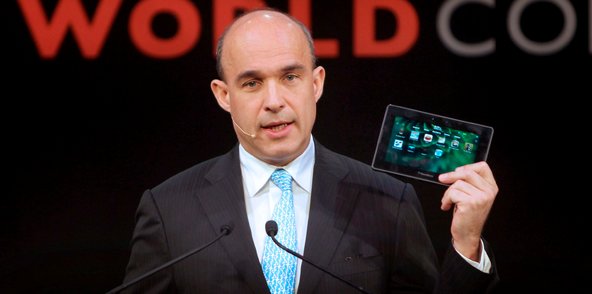 Toni Albir/European Pressphoto Agency Jim Balsillie with the BlackBerry PlayBook in 2011.
Toni Albir/European Pressphoto Agency Jim Balsillie with the BlackBerry PlayBook in 2011.
Jim Balsillie, the former co-chief executive and co-chairman of BlackBerry, has sold all of his shares in the struggling company, a regulatory filing indicated on Thursday.
Mr. Balsillie’s arrival at what was then called Research in Motion in 1992 and his personal investment of $125,000 saved the company in its early days. But Mr. Balsillie’s latest investment move means that he will not gain if the new line of BlackBerry 10 phones revive the company’s fortunes.
A filing with the Securities and Exchange Commission, dated Thursday, showed that Mr. Balsillie held no shares in the company as of the end of December. Mr. Balsillie owned up to 33 percent of the company, now called BlackBerry, before it became publicly traded and he reported holding 5.1 percent of its shares in a previous filing.
When asked about Mr. Balsillie’s pullout, Kris Thompson, a longtime BlackBerry analyst at National Bank Financial, replied: “Who cares?” BlackBerry’s shares initially slipped 7.5 percent to $12.94 in Nasdaq trading Thursday, but had recovered later in the morning.
Following a protracted and severe decline in BlackBerry’s stock price and American market share, Mr. Balsillie stepped down as both co-chief executive and co-chairman along with Mike Lazaridis in January 2012. While Mr. Lazaridis remains on the BlackBerry board as the company’s vice chairman, Mr. Balsillie resigned as a director in March.
A separate securities filing issued on Thursday indicated that Mr. Lazaridis, who co-founded the company, still holds 5.7 percent of BlackBerry’s stock.
Mr. Balsillie could not immediately be reached for comment. Adam Emery, a spokesman for BlackBerry, said the company does not “comment on holdings of individual shareholders.”
Earlier this week Mr. Thompson, the analyst, issued a report that praised many of the features on the new BlackBerry 10 phones but concluded that they will not significantly rebuild the company’s market share. He cited an impending wave of new products from larger competitors and the general lack of desirable and high quality apps for BlackBerry 10.
While Mr. Lazaridis handled the technology side of the company, Mr. Balsillie, an accountant, is widely credited with putting BlackBerry on the stable financial footing that ultimately allowed it to develop the BlackBerry device. He also played a pivotal role in convincing skeptical wireless carriers to carry the company’s first wireless e-mail devices on their networks.
Both men, however, were widely criticized for not responding more effectively and swiftly to the arrival of Apple’s iPhone and phones using Google’s Android operating system. Those smartphones now overwhelmingly dominate a market that BlackBerry created and was once leading.
At various times, Mr. Balsillie and Mr. Lazaridis have sold substantial stakes in BlackBerry to fund educational institutions in Waterloo, Ontario, the company’s hometown.
Article source: http://bits.blogs.nytimes.com/2013/02/14/former-blackberry-c-e-o-sold-all-company-shares/?partner=rss&emc=rss